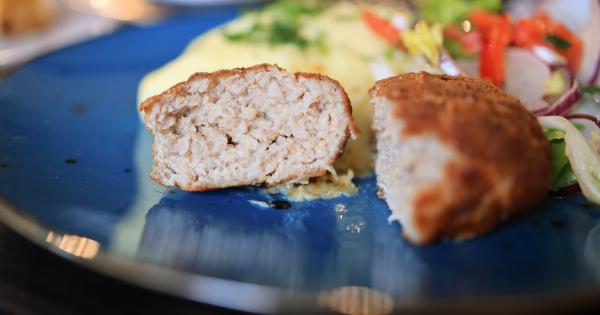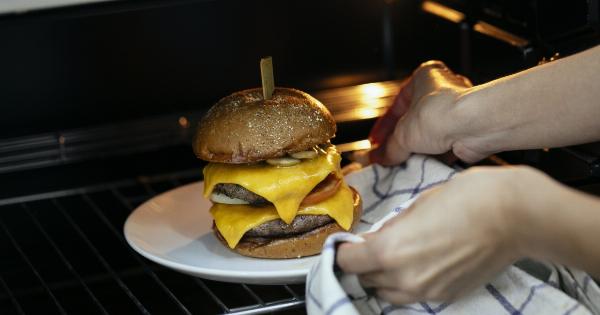Food is an essential part of our lives, providing us with vital nutrients for survival.
However, have you ever wondered if we can survive without eating? While it may seem counterintuitive, there are remarkable aspects of the human body that enable us to go without food for extended periods of time. From fasting to medical conditions, there are numerous reasons why it may be possible to live without consuming food.
1. Fasting for Health Benefits
One of the most popular reasons people voluntarily choose not to eat is fasting. Fasting has been practiced for centuries and is believed to have various health benefits.
It can help with weight loss, improve insulin sensitivity, promote cellular repair, and even boost brain function.
2. Medical Conditions
Some medical conditions affect the digestive system or the ability to process food, making it necessary for individuals to find alternative ways to obtain nutrients.
In cases such as Crohn’s disease, where the gut is severely inflamed, patients may require artificial nutrition sources.
3. Breatharianism
Breatharianism is a controversial philosophy that suggests humans can survive on sunlight and air alone. While there is limited scientific evidence to support this claim, some individuals claim to have successfully adopted this lifestyle.
4. Adaptive Abilities
Our bodies have remarkable adaptive abilities. In times of scarcity, the body can adjust its metabolic rate to conserve energy and utilize stored resources effectively. This adaptation allows individuals to survive without food for extended periods.
5. Fat Storage
The human body has evolved to store excess energy in the form of fat. Fat serves as a reserve that can be utilized during times of food scarcity. This stored fat can sustain the body for extended periods without the need to consume food.
6. Ketosis
Ketosis is a metabolic state that occurs when the body is primarily fueled by ketones, a byproduct of fat breakdown. In this state, the body can utilize fats as a source of energy instead of carbohydrates.
Some people intentionally induce ketosis through a ketogenic diet, effectively reducing their reliance on food.
7. Reduced Caloric Intake
While not completely eliminating food, reducing caloric intake significantly can improve health and increase lifespan.
Studies on animals have shown that restricted calorie diets can slow down the aging process and decrease the occurrence of age-related diseases.
8. Hibernation
Although humans do not hibernate like certain animals, the concept of torpor (a state of decreased metabolism) exists.
Some people argue that it might be possible for humans to enter a hibernation-like state, reducing their need for food during long periods of rest.
9. Fasting-Mimicking Diets
Research has shown that fasting-mimicking diets, which involve consuming a significantly reduced number of calories for a short period, can have similar benefits to full fasting.
These diets enable individuals to experience the advantages of fasting while still providing some nutrients.
10. Detoxification
The human body has built-in mechanisms to detoxify and eliminate waste products. This process is primarily carried out by the liver and kidneys.
While a healthy diet supports detoxification, the body can still eliminate toxins even without regular food intake.
11. Energy Conservation
When food is scarce, the body conserves energy by reducing non-essential functions. This includes lowering body temperature, decreasing heart rate, and even suppressing the reproductive system.
These adaptations allow the body to survive for extended periods without food.
12. Mind over Matter
The power of the mind should not be underestimated. Some individuals with exceptional mental control claim to be able to sustain themselves without food for extended periods.
While this state is not achievable for everyone, it demonstrates the remarkable potential of the human mind-body connection.
13. Autophagy
Autophagy is a cellular process where damaged or dysfunctional components are broken down and recycled. Fasting and certain dietary interventions can stimulate autophagy.
By promoting this process, the body can maintain cellular health and function without the constant need for external nutrients.
14. Nurture from the Environment
Humans can absorb certain nutrients through their skin, allowing them to derive some nourishment from the environment. While our ability to absorb nutrients through the skin is limited, it showcases the resourcefulness of the human body.
15. Spiritual and Religious Practices
Many spiritual and religious practices involve fasting as a means of cleansing the body and mind.
These practices often demonstrate individuals’ ability to go without food for extended periods, highlighting the strength and resilience of the human body.
16. Reduced Gut Workload
The digestive process requires significant energy and resources. By not consuming food, the gut workload is reduced, allowing the body to allocate resources to other essential functions, such as healing and repair.
17. Enhanced Mental Clarity
Some individuals report increased mental clarity and focus during periods of fasting. This heightened mental state may be attributed to the body’s metabolic adaptations and the absence of the energy-consuming digestive process.
18. Increased Autonomy
Reducing reliance on food enables individuals to experience a sense of autonomy and independence.
Breaking free from the societal expectation of constant eating allows individuals to explore alternative forms of sustenance and redefine their relationship with food.
19. Reduced Environmental Impact
By decreasing our reliance on food, we can reduce the environmental impact associated with food production, transportation, and waste. Opting for more sustainable alternatives or choosing to eat less can contribute to a healthier planet.
20. Improved Metabolic Efficiency
When the body is not constantly fueled by external sources, metabolic efficiency can improve. The body becomes more adept at using stored resources effectively, leading to a more efficient overall metabolism.
21. Waste Reduction
Not consuming food reduces the waste generated by packaging, food scraps, and other byproducts of the food industry. Adopting a lifestyle with reduced food intake can help minimize our environmental footprint.
22. Evolutionary Perspective
Throughout history, humans have faced periods of food scarcity. Our bodies have evolved to withstand these conditions and function optimally even during times without food.
Recognizing our evolutionary adaptability helps shed light on our potential to live without constant food consumption.
23. Gut Microbiome Diversity
While the gut requires regular nourishment, short-term fasting has been shown to promote diversity within the gut microbiome. A diverse gut microbiome is associated with better overall health and can be fostered through intermittent fasting.
24. Longevity benefits
Studies on various organisms have indicated that caloric restriction and intermittent fasting can extend lifespan. By reducing food intake, the body can potentially slow down the aging process and decrease the incidence of age-related diseases.
25. Increased Awareness of Body Signals
When we rely less on traditional mealtimes, our bodies may become more attuned to hunger and satiety signals. Tuning in to these signals enables individuals to develop a healthier relationship with food and eat intuitively.
Conclusion
While it may seem unconventional, numerous reasons exist to support the idea that we don’t always need to eat.
From fasting and medical conditions to our body’s incredible adaptive abilities, the human body showcases its remarkable potential to survive and even thrive without constant food intake. Exploring these possibilities can lead to a better understanding of our bodies and open the doors to new practices and lifestyles.































